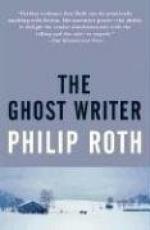|
This section contains 2,929 words (approx. 10 pages at 300 words per page) |

|
Interpretative fantasies, from Clarissa and Tristram Shandy to Finnegans Wake, Pale Fire, and Gravity's Rainbow, have traditionally concerned themselves with such problems as "validity," "discursivity," and "reality" vs. "textuality," particularly with the status of fictional texts, their origins, ends, and authoritative power. Philip Roth's recent novel, The Ghost Writer, is part of this tradition: it is about origins, and the problems of originality that any serious writer eventually comes to face. It is the kind of novel that forces us to reflect upon the act of writing, in a traditional sense, as an embodiment of "selfhood," and less traditionally, as the place where the "self" may be lost in the warp and woof of the text. In this first-person narration of writer Nathan Zuckerman's quest for a spiritual and aesthetic father, Roth presents us with a parodic reflection upon the notion of "textuality," or language in search of...
|
This section contains 2,929 words (approx. 10 pages at 300 words per page) |

|


